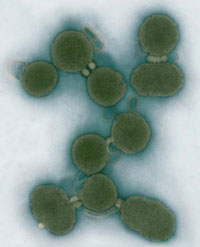Researchers at the J. Craig Venter Institute yesterday announced the successful construction of the first self-replicating, synthetic bacterial cell, which could potentially have numerous applications – including the production of new biofuels, according to Synthetic Genomics (SGI).
 Specifically, they are talking about new algae-based biofuels, if the researchers can take the discovery to that next step. They are working on using the same technique they used to create the synthetic bacteria to create synthetic algae, which is also single-celled, but more complex than bacteria. If they are successful, they hope to use them to create biofuels by photosynthesis.
Specifically, they are talking about new algae-based biofuels, if the researchers can take the discovery to that next step. They are working on using the same technique they used to create the synthetic bacteria to create synthetic algae, which is also single-celled, but more complex than bacteria. If they are successful, they hope to use them to create biofuels by photosynthesis.
SGI, which was founded by Dr. Venter and is the Institute’s primary backer, has an alliance with Exxon Mobil Research and Engineering (EMRE) group “focused on finding and optimizing (through synthetic genome techniques and other more traditional metabolic engineering techniques) algae to produce biological crude oil replacements efficiently.” The J. Craig Venter Institute has facilities in Rockville, Maryland and San Diego, Calif.; SGI is headquartered in La Jolla, Calif.
Photo credit: Electron micrographs were provided by Tom Deerinck and Mark Ellisman of the National Center for Microscopy and Imaging Research at the University of California at San Diego.

